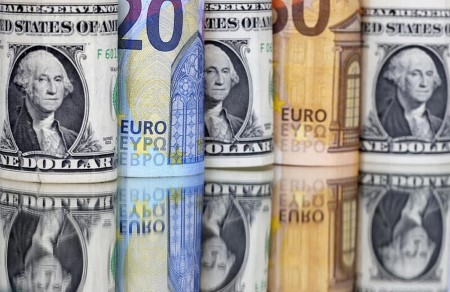




Philippines Trade Update: Imports weaken on tepid demand
 DOWNLOAD
DOWNLOAD

Policy Rate Updates: BSP outlook — cloudy with a chance of rate cut
 DOWNLOAD
DOWNLOAD

January Economic Update: Growth slows, prices rise
 DOWNLOAD
DOWNLOAD


US recap: EUR/USD’s Aug-Sept drop halved in haven, rate hike reset

Sept 9 (Reuters) – The dollar index fell 0.5% on Friday, still suffering the effects of aggressive 75bp rate hikes by the BOC and ECB this week and profit-taking on overbought long positions, but it managed to rebound after testing key support.
EUR/USD’s rally reached 1.0114 by the 50% Fibo of the August-September 1.0369-0.9864 drop before falling toward parity due to uncertainty regarding EU efforts to shield the region from its energy crisis.
Hawkish talk from ECB members and reports the central bank might begin discussing quantitative tightening in October failed to get EUR/USD back to its early highs.
However, it retained a 0.58% gain on the day and found buyers by the 21-day moving average at 1.0026 that it cleared for the first time since Mid-August.
Below-forecast Chinese inflation data got some wondering whether that would feed into lower price pressures elsewhere, helping government debt yields retreat and riskier assets recover, to the detriment of the haven dollar.
Despite the Fed’s back-to-back 75bp rate hikes and a third one being priced in for September, 2-year bund-Treasury yield spreads have risen from August’s -2.79% trough to -2.31% currently, just below Thursday’s -2.28% rebound high.
The Fed has already convinced markets to price in a nearly 4% terminal rate next year and less risk of inflation running rampant. The ECB has more recently been forced to join the rapid rate-hiking party after euro zone inflation overtook US inflation.
The most overbought dollar pair coming into this week was USD/JPY, which was down 1% after recovering from Friday’s dive to key supports by the 141.505 low on EBS. The low was by the minimum 23.6% Fibo of the frothy 130.40-144.99 August-September surge.
September’s 139.00-144.99 rise to 24-year highs came despite the uptrend in 2-year Treasury-JGB yields going flat, leaving prices ripe for a correction, particularly with Japanese officials warning against the yen’s rapid fall.
But without the BoJ moving away from ultra-accommodation mode, USD/JPY weakness would have to rely mostly on weaker Fed hike expectations, which makes Tuesday’s US CPI a focus.
Sterling was up 0.8% in the first full day of mourning after the death of Queen Elizabeth, an event that prompted the BoE to delay its previously scheduled Sept. 15 policy meeting until Sept. 22. Gains to 1.1646 were trimmed after the dollar broadly recovered from its lows.
A spate of major UK economic data next week and US CPI will sharpen the focus on the pace of Fed hikes versus BoE hikes, but sterling has tumbled on rising gilt-Treasury yields spreads since mid-August due to the rising cost of fiscal support to dampen the impact of surging energy costs.
(Editing by Burton Frierson; Randolph Donney is a Reuters market analyst. The views expressed are his own.)
This article originally appeared on reuters.com





 By Reuters
By Reuters